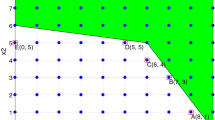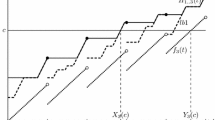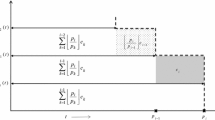Abstract
This paper considers the problem of design optimization for real-time systems scheduled with fixed priority, where task priority assignment is part of the decision variables, and the timing constraints and/or objective function linearly depend on the exact value of task response times (such as end-to-end deadline constraints). The complexity of response time analysis techniques makes it difficult to leverage existing optimization frameworks and scale to large designs. Instead, we propose an efficient optimization framework that is three orders of magnitude (1000 times) faster than Integer Linear Programming (ILP) while providing solutions with the same quality. The framework centers around three novel ideas: (1) an efficient algorithm that finds a schedulable task priority assignment for minimizing the average worst-case response time; (2) the concept of Maximal Unschedulable Deadline Assignment (MUDA) that abstracts the schedulability conditions, i.e., a set of maximal virtual deadline assignments such that the system is unschedulable; and (3) a new optimization procedure that leverages the concept of MUDA and the efficient algorithm to compute it.







Similar content being viewed by others
References
Arzén KE, Cervin A, Eker J, Sha L (2000) An introduction to control and scheduling co-design. In: IEEE conference on decision and control
Audsley N (2001) On priority assignment in fixed priority scheduling. Inf Process Lett 79(1):39–44
Audsley N, Burns A, Richardson M, Wellings A (1991) Hard real-time scheduling: the deadline-monotonic approach. In: IEEE workshop on real-time operating systems and software
Baruah S, Bonifaci V, D’Angelo G, Li H, Marchetti-Spaccamela A, van der Ster S, Stougie L (2012) The preemptive uniprocessor scheduling of mixed-criticality implicit-deadline sporadic task systems. In: Euromicro conference on real-time systems
Baruah S, Burns A (2006) Sustainable scheduling analysis. In: IEEE real-time systems symposium
Bate I, Emberson P (2006) Incorporating scenarios and heuristics to improve flexibility in real-time embedded systems. In: IEEE real-time and embedded technology and applications symposium
Bini E, Cervin A (2008) Delay-aware period assignment in control systems. In: IEEE real-time systems symposium
Chu Y, Burns A (2008) Flexible hard real-time scheduling for deliberative ai systems. Real Time Syst 40(3):241–263
Davare A, Zhu Q, Di Natale M, Pinello C, Kanajan S, Sangiovanni-Vincentelli A (2007) Period optimization for hard real-time distributed automotive systems. In: ACM/IEEE design automation conference
Davis R, Burns A (2007) Robust priority assignment for fixed priority real-time systems. In: IEEE real-time systems symposium
Davis R, Burns A (2009) Priority assignment for global fixed priority pre-emptive scheduling in multiprocessor real-time systems. In: IEEE real-time systems symposium
Davis R, Burns A, Bril R, Lukkien J (2007) Controller area network (can) schedulability analysis: Refuted, revisited and revised. Real Time Syst 35(3):239–272
Davis R, Cucu-Grosjean L, Bertogna M, Burns A (2016) A review of priority assignment in real-time systems. J Syst Archit 65(C):64–82
Davis R, Zabos A, Burns A (2008) Efficient exact schedulability tests for fixed priority real-time systems. IEEE Trans Comput 57(9):1261–1276
Di Natale M, Zeng H (2013) Practical issues with the timing analysis of the controller area network. In: IEEE conference on emerging technologies & factory automation
Eisenbrand F, Rothvoß T (2008) Static-priority real-time scheduling: response time computation is np-hard. In: IEEE real-time systems symposium
Hamann A, Jersak M, Richter K, Ernst R (2004) Design space exploration and system optimization with symta/s—symbolic timing analysis for systems. In: IEEE real-time systems symposium
Lincoln B, Cervin A (2002) Jitterbug: a tool for analysis of real-time control performance. In: IEEE conference decision and control
Liu CL, Layland JW (1973) Scheduling algorithms for multiprogramming in a hard-real-time environment. J ACM 20(1):46–61
Lukasiewycz M, Mundhenk P, Steinhorst S (2016) Security-aware obfuscated priority assignment for automotive can platforms. ACM Trans Des Autom Electron Syst 21(2):1–27
Mancuso G, Bini E, Pannocchia G (2014) Optimal priority assignment to control tasks. ACM Trans Embed Comput Syst 13(5s):1–17
Mehiaoui A, Wozniak E, Tucci Piergiovanni S, Mraidha C, Natale MD, Zeng H, Babau J, Lemarchand L, Gérard S (2013) A two-step optimization technique for functions placement, partitioning, and priority assignment in distributed systems. In: SIGPLAN/SIGBED conference on languages, compilers and tools for embedded systems, pp 121–132
Natale MD, Guo L, Zeng H, Sangiovanni-Vincentelli A (2010) Synthesis of multi-task implementations of simulink models with minimum delays. IEEE Trans Ind Inf 6(4):637–651
Saksena M, Wang Y (2000) Scalable real-time system design using preemption thresholds. In: IEEE real-time systems symposium
Samii S, Yin Y, Peng Z, Eles P, Zhang Y (2009) Immune genetic algorithms for optimization of task priorities and flexray frame identifiers. In: IEEE conference embedded and real-time computing systems and applications
Shin M, Sunwoo M (2007) Optimal period and priority assignment for a networked control system scheduled by a fixed priority scheduling system. Int J Automot Technol 8:39–48
Tindell K, Burns A, Wellings A (1992) Allocating hard real-time tasks: an np-hard problem made easy. Real Time Syst 4(2):145–165
Tindell KW, Burns A, Wellings AJ (1994) An extendible approach for analyzing fixed priority hard real-time tasks. Real Time Syst 6(2):133–151
Wang C, Gu Z, Zeng H (2016) Global fixed priority scheduling with preemption threshold: Schedulability analysis and stack size minimization. IEEE Trans Parallel Distrib Syst 27(11):3242–3255
Wang Y, Saksena M (1999) Scheduling fixed-priority tasks with preemption threshold. In: International conference on real-time computing systems and applications
Zeng H, Di Natale M (2012) Efficient implementation of autosar components with minimal memory usage. In: 7th IEEE international symposium on industrial embedded systems, pp 130–137
Zeng H, Di Natale M (2013) An efficient formulation of the real-time feasibility region for design optimization. IEEE Trans Comput 62(4):644–661
Zeng H, Di Natale M, Zhu Q (2014) Minimizing stack and communication memory usage in real-time embedded applications. ACM Trans Embed Comput Syst 13(5s):1–25
Zeng H, Ghosal A, Di Natale M (2010) Timing analysis and optimization of flexray dynamic segment. In: 10th IEEE international conference on computer and information technology, pp 1932–1939
Zhao Y, Gala V, Zeng H (2018) A unified framework for period and priority optimization in distributed hard real-time systems. IEEE Trans Comput Aided Des Integr Circuits Syst 37(11):2188–2199
Zhao Y, Zeng H (2017a) The concept of unschedulability core for optimizing priority assignment in real-time systems. In: Conference on design, automation and test in Europe
Zhao Y, Zeng H (2017b) The virtual deadline based optimization algorithm for priority assignment in fixed-priority scheduling. In: IEEE real-time systems symposium, pp 116–127
Zhao Y, Zeng H (2018a) The concept of response time estimation range for optimizing systems scheduled with fixed priority. In: IEEE real-time and embedded technology and applications symposium (RTAS), pp 283–294
Zhao Y, Zeng H (2018b) The concept of unschedulability core for optimizing real-time systems with fixed-priority scheduling. IEEE transactions on computers, p 1
Zheng W, Di Natale M, Pinello C, Giusto P, Vincentelli AS (2007) Synthesis of task and message activation models in real-time distributed automotive systems. In: Design, automation & test in Europe conference & exhibition, IEEE, pp 1–6
Zhu Q, Zeng H, Zheng W, Natale MD, Sangiovanni-Vincentelli A (2013) Optimization of task allocation and priority assignment in hard real-time distributed systems. ACM Trans Embed Comput Syst 11(4):1–30
Acknowledgements
This paper is partially supported by NSF Grants No. 1739318 and 1812963.
Author information
Authors and Affiliations
Corresponding author
Additional information
Publisher's Note
Springer Nature remains neutral with regard to jurisdictional claims in published maps and institutional affiliations.
Rights and permissions
About this article
Cite this article
Zhao, Y., Zeng, H. The concept of Maximal Unschedulable Deadline Assignment for optimization in fixed-priority scheduled real-time systems. Real-Time Syst 55, 667–707 (2019). https://doi.org/10.1007/s11241-019-09332-0
Published:
Issue Date:
DOI: https://doi.org/10.1007/s11241-019-09332-0




